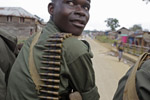
GOMA, Democratic Republic of Congo — Two days prior to New Year’s Eve, a soldier with the underfed, underpaid, and poorly managed Congolese national army, or FARDC, blew up on a civilian at a bar in the town of Fizi during an apparent extortion attempt. A fight ensued and the civilian was seriously wounded; he is in critical condition at a local health clinic after being shot in the abdomen.
Apparently unconscious of his transgression, the soldier who was responsible for the violence returned to the crime scene on New Year’s Eve to celebrate.
Enraged civilians who witnessed and were aware of the soldier’s illegal and unnecessary beating of an innocent two days earlier attacked the soldier. An angry mob ultimately beat and lynched him. This reaction triggered a violent reprisal the next day by the soldier’s comrades-in-arms that included gunfire on civilians, causing many to flee the village. The army commander whose base is said to be close to Fizi came to rescue the people who had been forced to flee their homes due to the reprisal attacks. However, the displacement has had a tragic consequence. Amid the chaos caused by the incident, 33 women were brutally raped, at times by multiple individuals. Host families in the nearby town of Uvira who were aiding the displaced told Enough that rapes were carried out by angry FARDC elements who wanted revenge on the villagers responsible for lynching their comrade.
The governor of South Kivu province traveled to Fizi with the head of the local MONUSCO contingent to assess the humanitarian needs. One civil society member contacted by Enough said that there was a 60-mile distance between the nearest MONUSCO base and the area where the violence occurred, leaving wiggle-room for excuses from U.N. peacekeepers who couldn’t intervene, regardless of the three-day window prior to the FARDC attack. Another local member of civil society who wished to remain anonymous stated, “The U.N. Security Council should be honest and define clearly MONUSCO mandate as simple spectators because in reality, they’ve never kept peace.”
Photo: Congolese soldier (AP)

